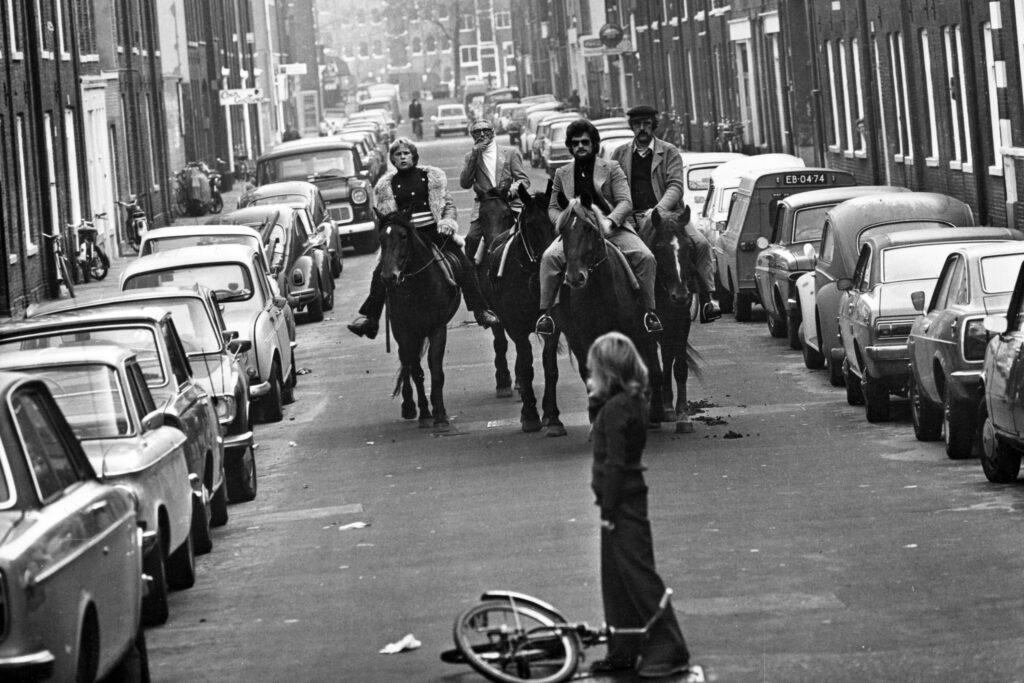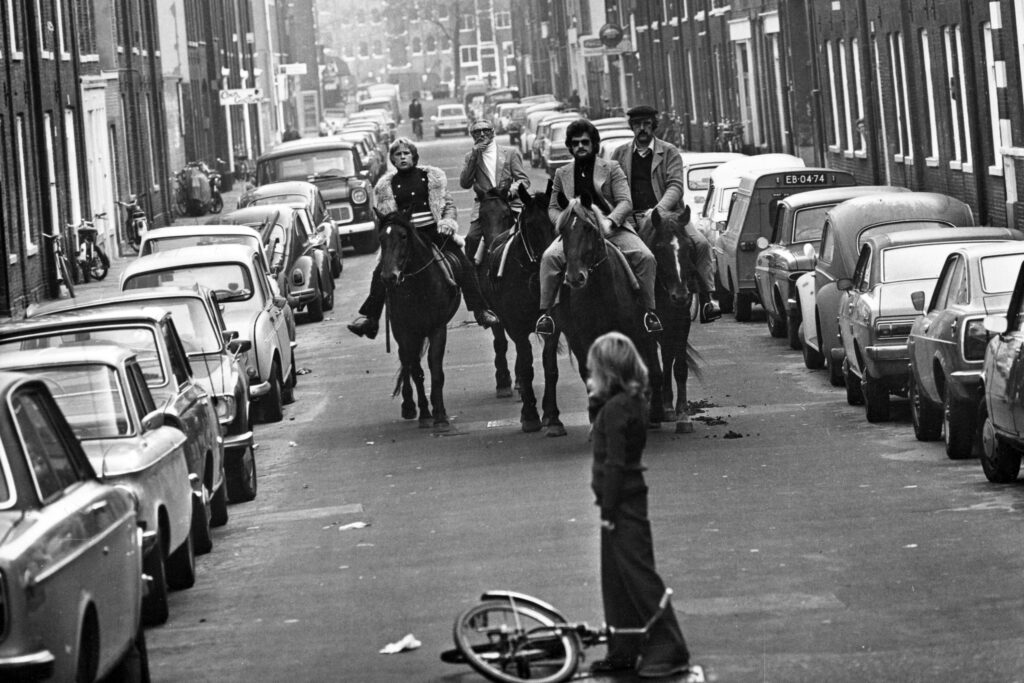Oil as Sin
Energy Ideology and Utopia

In September 2024, Saudi Arabia withdrew from its policy of stabilizing oil prices at the symbolic level of $100 per barrel. Having stopped price-gouging, the Saudis intended to displace Russia and Iran, two belligerent petrostates, from the oil market. The same month that saw two major wars in Eastern Europe and the Middle East, also saw Storm Boris in Central Europe and Hurricane Helene in North America. Terrible news about extreme weather events was competing for attention with horrible news about extreme political events. With more than one hundred nations having elections in 2024, including an unpredictable vote in the US, war and climate have come to the fore of global politics. But of course, all these issues have nothing to do with each other.
Nothing but oil.
What’s in the Price?
It was 1973, and Joe Biden had just become the junior senator from Delaware. Having failed in a war with Israel, several Arab countries imposed an oil embargo. They nationalized oil that had been traded by transnational corporations. Negotiating behind closed doors, governmental officials increased the oil price threefold. Decolonization turned global oil, a private business with gigantic profits and risks, into a network of state properties and sovereign funds. In the meantime, American drivers spent days in the lines at gas stations. Coincidentally or not, both the President and Vice President of the USA resigned shortly. The American politicians realized that their fate depended on oil prices.
Time passed and oil flew. It was 1991, and Vladimir Putin had just become a junior official in St. Petersburg. The price of oil was approaching its lowest point ever – the Soviets and the Saudis were at odds over the war in Afghanistan. Moscow stopped paying salaries, and the impoverished drivers could not buy petrol. Coincidentally or not, the Soviet president resigned, and his country collapsed. Fifteen new independent states, including Russia and Ukraine, emerged from the dust. The Russian politicians realized that their fate depended on oil prices.
Oil price is a political creature. Wayward and tactless, it has little to do with the production cost. It barely responds to the fluctuations of demand: whether oil costs $30 or $100 per barrel, you buy it because it meets your vital needs, which means that you would buy it for $130 as well. Profit margins in the oil industry are as different from the margins of the car- or computer-makers as behemoths from rabbits. Any price is a relation: when you fill-up the tank, you exchange the gallons for that many hours of your labor, or for that much restrain in your consumption. The price of oil indicates the proportion between hydrocarbons and the rest of the economy – that very relation between resources and labor which is central to capitalism. The more expensive are oil, gold and other natural resources, the less money remains in the households of those who make food, houses, or computers. Everyone who pays their bills prefers low and stable prices of energy. An enormous machinery of agricultural and fuel subsidies responds to their needs: taxing productive labor, governments of the world pay trillions a year to those who drill and burn fossil fuels.
Low prices of oil were a part of the bygone era of carbonization. Markets looked unstoppable and the Earth unlimited. Since then, we have learned that it is finite and, moreover, its boundaries are frighteningly close. Heat waves, floods, hurricanes, droughts, famines, forest fires and the melting permafrost threaten our survival. Hitting planetary limits, we are replacing carbon by less harmful but more expensive sources of energy. High prices of energy would incite its low-carbon sources – hydro, wind, solar, nuclear – to proliferate in competition with fossil fuels. The new era of decarbonization needs high and growing prices of oil, which will punish its extravagant consumer in the same way as the exorbitant prices of alcohol or sumptuous goods punish their buyers.
But here’s a catch. Increasing the price of filling up your tank or charging your batteries would cause major problems for democratic elections in many countries. This would be enough for a democratic taboo on anything that increases the price of energy, but there is more to it. High energy prices would benefit authoritarian petrostates, which are selling us the oil and gas that we are trying to phase out. Using their windfall profits, these countries start wars, spread disinformation, and export pollution. The catch is that while low oil prices obstruct decarbonization, high oil prices enrich the petrostates. Our inability to find the golden mean between these two extremities, or to change the playing field altogether, leads to the crisis.
About one hundred years ago, Karl Mannheim, a Hungarian sociologist, juxtaposed ideology and utopia. Not a Marxist, he believed that “ideas were products of their times and of the social statuses of their proponents.” Mannheim saw ideology as a net of concepts that justifies the established order, and utopia as the imagery that subverts this order by presenting possible alternatives. Utopias, he wrote, “burst asunder the bonds of the existing order, and what was an ideology merely served to conceal its reality.”
Stability of oil prices is our ideology. Their growth is our utopia. As it often happens to utopia, this road is paved with catastrophes.
The Ideology of the Crisis
“Crisis” means a turning point, a condition that is limited in time and space. The contemporary crisis, however, looks permanent and ubiquitous. This crisis involves wars, pandemics, economic turmoils, political cataclysms and climate change. Having no visible alternatives, the crisis is so large and interconnected that it’s difficult to define it.
There are many notable attempts, however. Isabella M. Weber, a German economist, created the concept of disaster capitalism, which adjusts the core industries to their chosen crises so well that these businesses create new disasters for their farther enrichment. Adam Tooze, a historian at Columbia University, operates with the concept of “polycrisis”, which has no central cause but multiple manifestations. A competing word is “permacrisis”, a permanent condition in which neither salvation nor death is imaginable. In these conceptual constructions, a crisis is a crisis, a present is a present, and they will always be.
Ideology works in circles, and only utopia could disrupt them. An idea that the future will be different from the present is not a heresy. It is a healthy, realistic feeling that is based on experience and gives hope. Coming mostly from Europe, an influential school of thought has identified the driving force of the crisis, its central cause: climate change. Bruno Latour, the leading French scholar, wrote that any election has turned into a choice of climate policy, and any war is a battle for survival in the climate crisis. Anthony Giddens, the most prominent British sociologist, wrote that the necessary changes are so profound that people tend to defer them until they feel it is too late to do anything. Ulrich Beck, the icon of German social science, said that climate change would save us from ourselves. For centuries, Kantian optimism competed with Voltairean skepticism, and this race contniues. For both sides, however, it should be easier to imagine the end of the crisis than the end of the world.
A response to climate change requires political action that features vigor, solidarity, and a sense of purpose. The political stakes are so high that comparisons come from the experience of wars and revolutions. Like a war, climate action confronts appeasement and pursues victory. Like a revolution, climate politics alternate between utopias and realities, radical projects and the reactionary Termidor. Like all of them, climate action is divisive: it splits international partners into friends and foes, and the division cuts through the domestic population as well.
Legislated by the European Parliament in 2021, the Green Deal commits the continent to halving its emissions by 2030 and reducing them to net zero by 2050. Following the EU, the US, China, Japan, and dozens of other countries have adopted their own plans of decarbonization. Political leaders of energy transition imagine it as a common cause that would unite the world. However, all plans of decarbonization would impoverish those who extract fossil fuels. Those who bring them from the well to the gas station, electric plant, or boiler in your house, would suffer as well. These petrostates, oil traders and refineries are some of the most powerful decision-makers and richest lobbyists in our world. Preferring their particular interest to common good, these suppliers launch disinformation campaigns. They interfere in the elections. Some – Russia, Iran and Venezuela – have started local conflicts that could turn into a global war. There is nothing attractive about these petrostates – they look very much like dystopian novels or horror films. They oppress their own people, boost inequalities, and start wars. But the force of the democratic taboo makes them untouchable: nothing should lift oil prices.
Is it a Market?
Combining the biggest volumes with the longest distances, oil trade was the backbone of globalization. It is still the biggest market in the world. It is deceptively free – prices are floating, capital is flowing, and the players make bets of incredible scale. The paradox is, however, that it is not a market. Oil supply is dominated by the petrostates of Northern Eurasia, Middle East and Southern America. The success of North American shale companies, which are all private, has not changed the fact that аlmost all oil in the world belongs to the states rather than private owners. The Arab countries declared state-wide monopoly on energy in 1973, Venezuela nationalized its oil in 1976 and Russia re-nationalized most of it in 2004. The time of oil barons is over – this is the time of oil sultans. National leaders, some of them bloody dictators, “coordinate” production quotas and price levels in their telephone conversations. Shaped as the symbol of decolonization, OPEC turned in 2016 into OPEC+, an instrument of new imperial endeavors that includes Russia. Successfully or not, it is setting oil prices despite the extreme events that these prices help sustain. With its cartel members, pre-planned quotas, and sovereign funds, oil trade is much closer to Soviet-style communism than to the “invisible hand” of classical economics.
From the climate perspective, the Cold War was very hot: the First World of capitalism and the Second World of socialism jointly heated the planet. The highest drop in global emissions occurred in 1991 when the collapse of the Soviet Union led to de-industrialization. Ironically, Russia’s oil and gas sales soon compensated for the lack of industrial income. Everything that the country needed could be exchanged for the hydrocarbons that would be burned elsewhere. It was a good deal and a model for other petrostates. On the one hand, they got super-profits from exporting their oil. On the other hand, they were not responsible for the emissions that this oil generated abroad. They still aren’t.
While Russia confronts modernity because of its material interest in the doomed oil exports, China has been fully invested in renewable energy. With its coal mines and oil imports, China is the biggest emitter on the planet. It is also the global leader in making everything that is needed for the green transition. Rapidly growing, co-dependence of these superpowers is a major threat to the decarbonizing world for two reasons. The unlimited supplies of discounted oil, gas and coal from Russia help China forget about energy transition. The advanced green economies respond by protectionist policies, which make solar panels, electric cars and other gadgets more expensive. The result is the same – more oil would be burned and more emissions produced.
As I demonstrated in a recent book, different natural resources have different political qualities. Only oil gives super-profits that allow the dictator to prosper despite his corrupted elites, impoverished subjects, and senseless wars. From Libya to Russia, from Iran to Venezuela and from Saudi Arabia to Turkmenistan, a typical dictator is the leader of a petrostate. In the last century, an amazing feature of oil was its affinity – moreover, mutual attraction – with the neoliberal state. In our century, oil trade has been largely appropriated by modern dictatorships. Comparing neighboring countries that do and do not have oil, Michael Ross demonstrated that the petrostates have larger governments and higher inequality. Studying the wars of the twenty-first century, Jeff Colgan showed that the petrostates start the wars more often, and wage them longer than the oil-consuming states. Petroaggression does not explain, however, the purposes of the petrostates. Why would they fight for additional reserves if they are not able to sell their own?
Under the pressure of decarbonization, petrostates see the reduction of their exports as a security threat. The literature on petroagression does not differentiate between wars for delivery routes (Russia vs. Ukraine, Azerbaijan vs. Armenia, the dark story of Nord Stream, the Houthi against the Western traffic in the Red Sea) and conflicts about oil assets (Iraq vs. Kuwait, Venezuela vs. Guyana). Globally, more oil is transported by land than sea, and this leads to a further differentiation: since there are no states on high seas, only terrestrial trade sees a particular type of petroagression in which a petrostate wishes to annex the transit state . Such is the war we’ve seen in Ukraine. Maritime or terrestrial, most of the armed conflicts of this century would not have happened if one or both sides had no petrodollars in their sovereign funds.
The Catastrophic Utopia
Most countries of the world have made their net-zero pledges – the petrostates haven’t. Their governments see decarbonization as a zero-sum game or, even worse, a conspiracy aimed at depriving them of essential profits. Rich countries standing on hard terrain, they see their prospective losses like the poor island nations see them – they will go under, physically or economically. Combining deception with violence, the petrostates effectively obstruct a gradual energy transition. One could imagine that high oil prices could provide partial compensation to the petrostates and other fossil suppliers. Buying precious time of peace, this use of green tax would signal a historical defeat of climate action, which needs massive investments. Alternatively, a green tax would provide investments on the massive scale that is required for the actual transition. These are two opposite scenarios for the future. The former would save oil industry, the latter would save the world.
Rooted in the Cold War, there was a theory about the future convergence between capitalism and socialism. It is still an approximation of our catastrophic future. Engaged in the global trade, governments and sovereign funds have learned how to shape the markets by tariffs, subsidies and savings. However, we still translate our risks and benefits into prices. Abolishing the subsidies that aim at decreasing the consumer prices of energy, an alternative system will introduce a sophisticated system of sumptuous taxes. Due to this system, oil will be expensive for the buyer and cheap for the supplier. Measured in trillions, the difference will move from oil suppliers to national governments. Sin taxes increase the price of alcohol and tobacco and decrease their use. Green taxes increase the price of fossils and decrease emissions. They do not eliminate it altogether – taxation is not a prohibition. Effectively changing lifestyles, new taxes will leave the choice in the hands of the consumer.
Again, the main issues here not economic and ecological, but moral and political. A condition for introducing any such system is a widespread acceptance of the fact that oil consumption is sinful. Overuse of oil products should evoke guilty feelings in the same way that the overuse of commodities that create harmful addictions does. Such overuse requires compensation or retribution – not a voluntary donation for the right cause (we do not pay taxes voluntarily) but rather an agreement that the punishing tax is ok. Despite many decades of green activism, we do not see that democratic public opinion is ready to acknowledge this truth. As Mario Draghi, a former Prime Minister of Italy, put it in a recent report to the European Commission, “citizen engagement is essential for a successful transition”. So far our joint attempts to produce this engagement by means of education, mass media and popular culture, have not been felicitous. Instead, we undergo a real-life process that I would call catastrophic learning.
Homo Sapiens are rational by definition, but it does not save them from denying unpleasant realities until they occur. “We learn geology the morning after the earthquake”, said Ralph Waldo Emerson well before social media started to demonstrate this effect almost daily. If humanity has proved its inability to take pre-emptive actions on climate, these necessary actions will follow the catastrophes rather than prevent them.
There is a deep historical pattern under it. The Enlightenment started after the Lisbon earthquake of 1755, which indicated that even God had its limits. Proving a similar thesis about Communism, the Chornobyl catastrophe of 1986 gave a boost to the Soviet Perestroika. The key to surviving the catastrophic future is the ability to learn from the tragic past. The new world will be born of the spirit of tragedy. The costs are outlandish, but a hope remains that humanity would learn from them. Paraphrasing a famous saying, we should never let a catastrophe go to waste.
Will a shock therapy of climate catastrophes pave the way to the new Enlightenment? Built by the survivors, renewable economy will be more effective, less centralized, and easier to administrate. Shorter distances of energy supply will mean fewer security threats, lower insurance costs, and lower interest rates. Reversing financialization and securitization of the oil era, this new world will be green, just, and safe. Polluters will be paying twice, first for the fuel they burn and then for the emissions they spread. The price of any commodity or service will reflect the emissions that it brings to the world. Redistributing massive amounts of wealth, the Climate Leviathan will impose new checks and balances on our relations with the planet. Hierarchically built, global powers will be sneaky and well-armed. Stopping wars and healing traumas, they will have two purposes: reducing damage to nature and boosting human creativity. Their politics would enjoy the democratic support of the survivors who would remember the series of unheard-of catastrophes. Wars and weapons will be forbidden in this utopian world. Property will be private but inequality, limited. With energy more and more expensive, entertainment would be increasingly digital, food largely vegan, and sin taxes ubiquitous.
Is it a utopia or dystopia? It is both – a convergence, perhaps. Despite all failures, we are closer to it than we were in 1917 or 1989. After all, it is the dreamers who inherit the world.
Alexander Etkind is a professor at Central European University in Vienna and director of the Open Society Hub for Politics of the Anthropocene.



